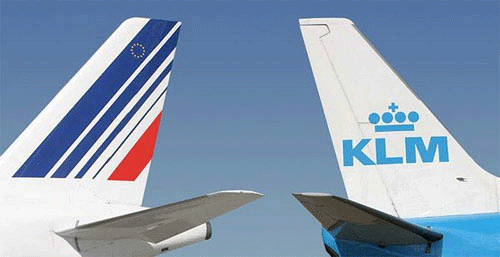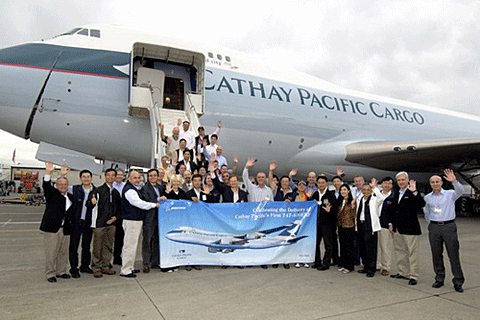Some Numbers Raise More
Questions Than Answers

A recent report that appeared
in Air Cargo News FlyingTypers August 5, quoted IATA Director
General and CEO Giovanni Bisignani who noted a drop in air cargo traffic
and subsequent projected losses.
Mr. Bisignani looking at the broader airline
business described the situation as a crisis.
Surely things are not good as the cost of
fuel has deflated bottom line numbers that were soaring just one year
ago.
But with respect to air cargo there are
other views about what is happening right now.
Recently global logistics provider Aramex
announced a 23% increase in revenue for the second quarter of 2008, over
the same period in 2007.
From the same region another report: “Maximus
Air Cargo, the Abu Dhabi based heavy-lifter has more than tripled its
turnover during the first four months of 2008 compared to 2007.”
Also in Air Cargo News FlyingTypers
last week: “KL/AF said that total cargo business revenues in the
first quarter of this year ended June 30 were at 762 million Euro (US$1.18
billion), up 10.5 percent compared with the same period last year. “The
airline group said revenues from the transportation of cargo were 717
million, up 11.6 percent versus the same period a year ago.
“KL/AF cargo traffic handled in first
quarter rose by 1.5 percent."
So it goes with statistics.
Some are up while others are down.
What should air cargo at large make of all
this?
Is the industry up or down as 2008 continues
to unfold?
Should we salt away our resources or go
full-blown into continued market development?
Who is wrong and who is right and more importantly,
what are the immediate conclusions that can be drawn for business planning
purposes?
Maybe the first question in all of this
should be:
What sources are being used to compile the
next breathtaking stunning success story or flop?
In my view, based on the examples above,
although well thought out and based on actual traffic, none addresses
the truly meaningful measure for a business, the profit.
Tonnage as a measuring tool is passé.
Only government compiled statistics record
tonnage.
Tonnage numbers have their best audience
in annual reports.
Revenue gets a little closer to the issue
but doesn’t tell the whole story.
It also depends on the nature of the business
as we delve a little deeper into the examples quoted here.
Aramex touts itself a “Global Logistics
Provider,” implying multimodality and with that claim we note a
lack in their figures of specific air cargo relevant data.
Maximus Air Cargo is an all-cargo airline,
so their numbers are more interesting.
KL/AF is a combination carrier. It has a
cargo division, but to the best of my knowledge, it’s not a distinct
legal entity which makes it harder to measure, slice and dice to differentiate
between cargo carried on its all cargo aircraft and cargo moved on passenger
planes, each with a rather different cost basis.
So apparently there is no simple answer
as to how are we in air cargo doing, only more questions.
Is a meaningful matrix one that is purely
origin/destination based as opposed to systemwide?
Is it taking a global customer and looking
at the totality of the business it generates for the airline and whether
it is profitable overall, with ups and downs in various markets?
Or is the cost basis in each case, for a
“global logistics provider,” a Middle East based all-cargo
airline and a major combination carrier operating world-wide just not
equal to compare?
It remains elusive as now you see it, now
you don’t!
Man has a fascination with numbers, rankings
and statistics.
To ferret out “the magic answer,”
keep polishing the crystal ball and spinning the Rubik’s Cube or
just roll the dice and keep humping the freight.
You decide.
Ted
Cathay
Numbers Up

 Hong
Kong-based Cathay Pacific Airways and sister airline Dragonair carried
a combined 142,770 tons of cargo and mail in July, up 5 percent
against the same month last year. Hong
Kong-based Cathay Pacific Airways and sister airline Dragonair carried
a combined 142,770 tons of cargo and mail in July, up 5 percent
against the same month last year.
Capacity for the month, measured in
available cargo/mail ton kilometers, grew 2.4 percent while the
cargo and mail load factor dipped by 0.1 percentage point to 66
percent.
“We were pleased to see cargo
and mail tonnage growth once again stay ahead of capacity growth,
though demand into and out of Northeast Asia remained weak,"
said Titus Diu, Cathay Pacific's general manager cargo sales and
marketing.
"The continued high price of
fuel is making it more difficult to operate profitably, particularly
on long-haul routes, making it imperative to move to a more fuel-efficient
fleet.
“Our second Boeing 747-400ERF
Extended Range Freighter, which arrives in August, will be a boon
on long-haul trunk routes.”
For the year to date, the two airlines
have seen a 6.6 percent rise in cargo and mail tonnage (971,169
tons), compared to a 6.2 percent capacity climb.
David
|
India
Gloom Misses Cochin

“The encircling gloom.”
That is how a senior aviation industry expert described the present India
transportation scenario.
But as Air Cargo News FlyingTypers reported
sometime ago that the gloomy scenario has not deterred a few of the air
cargo startups from going ahead with their plans.
One of the little known moves is by the
first Greenfield private airport in the country, Cochin International
Airport Ltd. (CIAL), to start an international cargo airline to be called
Air Kerala.
The carrier would in the initial stages
ply between Kerala's airports and destinations in the Middle East.
Owned by the government of Kerala, CIAL
was established with 74 percent of the cost raised from around 10,000
Non-Resident Indian shareholders from 30 countries.
 The
airport's success led the Kerala government to plan on floating its own
airline. The
airport's success led the Kerala government to plan on floating its own
airline.
Of course, there have been offers from a
large number of non-resident Keralites to take a stake in the airline.
In fact, CIAL has started preliminary consultations
with a number of domestic and international carriers to join hands. Though
it could not be confirmed, the CIAL management has apparently approached
Air India to convert old passenger planes to freighters.
Managing Director of Cochin International
Airport Limited (CIAL) Shri S Bharath is so enthusiastic that he said
if the ministry of civil aviation gave permission to fly to Gulf destinations,
"we will immediately start the services." At some point of time,
he also mentioned, the airline could introduce passenger services to the
Middle East.
A few words about CIAL.
The airport was the first one to have been
established in the PPP model (Public Private Partnership). The airport
started its international cargo operations in October 1999 and CIAL took
over the cargo custodian functions from Air India from December 1, 2000.
There is an international cargo warehouse spread out over an area of 6000
sq. metres, which is equipped to handle all types of export and import
cargo.
The air cargo project will supplement the
airport's recent move to set up a building for perishable cargo.
To be built at a cost of $14.8 million,
the place would the "only one of its kind attached to any airport
in the country," according to Mr. Bharath.
When it is completed in 2009, the MD informed,
air cargo Cochin will be able to store perishable food items and vegetables
for more that a week.
With this center and freighter service,
CIAL would be able to export and import vegetables, fruits, flowers, fish
and meat products.
The airport expects the perishable commodities
figure to go up to 24,070 tons by 2015.
According to last figures (2005-06) available,
the exports totaled 9,270 tons.
While most other airports are afraid that
running costs will mount, CIAL remains unfazed. It has set out for a slew
of major expansion. On paper, there will be 18 different projects, which
include an IT park, an aviation academy, a maintenance and hangar unit,
star hotels and an 18-hole golf course.
For its part, Boeing has gone on record
to mention that it would help set up the new Air Kerala.
Dr. Dinesh Keskar, Senior Vice-President
(Sales), Boeing, who was in Cochin sometime ago, mentioned that his company
would only be pleased to associate with the Air Kerala venture and support
it by conducting studies and also providing advice.
CIAL's move to set up a perishable cargo
center has also started attracting attention. Captain G R Gopinath (of
the erstwhile Air Deccan and presently Deccan Cargo fame) has held talks
with CIAL to set up a joint venture for dedicated cargo facilities across
the country.
These cargo facilities across the nation
will service the hubs to be set up at Nagpur and Hyderabad.
Tirthankar Ghosh
Logistics Network Goes
Global
 Early
in the day if the need arises to write to Roy Stapleton, founder of Global
Logistics Network, I type in the address Rstapleton@go2gin.com and laugh
realizing that his actual address is RStapleton@go2gln.com
and it is too early in the day for cocktails anyway. Early
in the day if the need arises to write to Roy Stapleton, founder of Global
Logistics Network, I type in the address Rstapleton@go2gin.com and laugh
realizing that his actual address is RStapleton@go2gln.com
and it is too early in the day for cocktails anyway.
But Roy laughs about that one too.
After almost 30 years in the industry spanning
both the airline and freight forwarding sectors, with such companies as
DHL/AEI UK & USA, BAX Global USA, GeoLogistics USA and Singapore Airlines
Cargo UK, New Jersey USA-based Roy Stapleton wanted a change and a new
challenge.
He also wanted to bring some good to air
cargo.
So in 2002, he founded the "Global
Logistics Network" (GLN).
Roy puts it this way:
“Although at the time, there were
probably around 20 freight forwarding organizations, I was convinced of
the need for a forwarding group driven by someone who knew the industry
at a high level of expertise, and was willing to share and build for a
better business climate.”
Roy also says that his vision “was
and continues to be for a quality driven network rather than a quantity
driven one.
“GLN has grown to be 233 members in
359 cities with 630 member offices in 120 countries.
“Annual revenues of GLN members exceed
US$2 billion.
“My view is that GLN is a natural
home for many local and independent freight forwarders.
“GLN members develop new business
relationships with other tried and trusted GLN members.
“We reach out so that GLN membership
can take advantage of our long experience in the industry.”
But we wonder aside from the expected what
else does GLN offer?
“GLN has been able to develop products
within GLN that are of value to our members.
“GLN has an annual conference that
is focused exclusively on business development between members.
“GLN offers an Amber Alert and Accounts
Receivable Insurance Funds to ensure the integrity of payments between
members and of late, GLN has forged alliances with several leading air
and ocean carriers.
“GLN's upcoming conference in Bangkok
(October 5-9, 2008) promises to be a record breaking event.
“This sixth edition of the yearly
global membership meeting will include a Carriers’ Day dedicated
to interaction between carriers and GLN members to discuss matters of
mutual interest.”
But we also wonder with growing numbers
of organizations and trade shows, where does GLN go from here?
“We conduct a quality network with
excellent camaraderie and communication between members. At GLN we make
it our business to insure that everybody knows what to expect.
“Also despite the recent business
slowdown GLN has suffered no loss of membership either. In fact as indication
of the challenges of doing business in transportation today and our reputation,
GLN has grown annually since inception.
“There is no lack of quality companies
seeking to join GLN.
“Although new members normally come
from referrals, after extensive research just this month newly-formed
Crane Worldwide based in Houston, Texas opted to become a member of GLN.
“We believe that this decision by
the Crane Worldwide management team reflects their desire to work with
a professional quality network," says Roy Stapleton who celebrated
40 years in the logistics industry July 1st.
Geoffrey
Jelger Knows
His Bananas
 A
good rule of thumb when talking about perishables is to dialogue with
someone who knows something about bananas. A
good rule of thumb when talking about perishables is to dialogue with
someone who knows something about bananas.
If there is one perishables that almost
everyone recognizes and has an opinion about condition before buying,
it’s that large or small bunch of bananas in the local store or
vegetable and fruit stand.
Jelger de Vriend has extensive experience
in the fresh produce world. From the banana farms of Latin America to
the European retail shelves.
He held several positions in Chiquita Brands,
Albert Heijn and Royal Ahold covering areas from agricultural production
to retail merchandising.
In 2007 he set up Innovative Fresh, a company
for the fresh produce world.
Innovative Fresh builds strategic innovation
partnerships with leading retailers, the best growers, the most advanced
logistical service providers, and with the most admired research groups
and seed companies.
Talking innovation from “seed to shelf”.
Jelger firmly believes that it is time to think about the customer,
“Innovative Fresh drives innovation
with the customer in mind,” he says “innovation that adds
value across the cool chain.”
“I have a passion for produce!
“For without passion there is no progress!
“Perishables are like any other product
group, but with two distinct characteristics, variable quality and variable
production.
“That is why seed companies and traders
make large profits, and why it is important to spread production areas.
In Netherlands these two characteristics
are why we have a flower auction that determines the pricing mechanism.
“In the perishables business building,
“relationships” (“trust”) is important.
“But in order for the growing of better
relationships across the cool chain, both the perishables shipper and
the transportation business must translate fundamental knowledge into
practical concepts.
“The perishables industry needs to
develop systems for real time shelf life monitoring while both the industry
and transportation create transparent and collaborative cool chains.
What this means is that across the board
we need to change our quality culture.
jdevriend@passion4produce.com
August
Summer Monday

This time of
year is for holiday.
Although as riders aboard the world-wide
web, we may never be totally out of touch again.
As example of that, Air Cargo News
FlyingTypers readership during July and so far in August is up
22% as compared to the same period last year.
Some mail we are reading from air
cargo people at the lake and elsewhere advises “limited
access to emails” and “only dial-up web access”.
Yeah—direct dialing is really
roughing it!
But the hazy days of summer are
fleeting as people reclaim something of themselves and spend quality
time away from what else occupies the rest of the year.
Here in America, the butter and
sugar corn is sweet and wonderful and great eating for the next
weeks, although expensive, what with more land here being farmed
for corn (ethanol fuel) than at any time since WWII.
“Outside of a dog, a book
is probably man's best friend, and inside of a dog, it's too dark
to read," Groucho Marx said.
Take it easy.
|
|



